The reasons I chose to reach Mamou and sleep in a hostel were not met. I wanted to sleep dry and have electricity for my laptop. I only managed to stay dry, as the electricity cut at midnight and is still not back at noon. There was a woman talking and laughing very loud at 3 am outside the compound, and from 6 am a goat just behind my window kept bleating. I used my anti-dog anti-monkey air gun but without success.
I write a bit, change my broken spoke, and depart on a better mood than yesterday. Today I am leaving the mountains of the Fouta Djalon.
The road to Kindia, Guinea’s second or third largest city, should be mostly downhill, as I drop from 700 to 200 meters high.
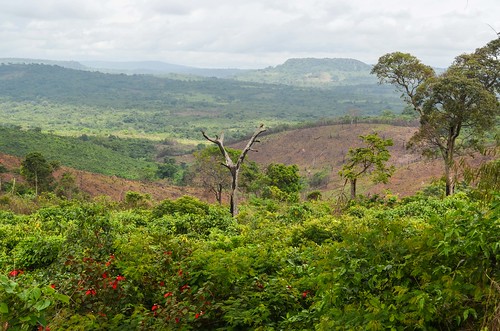
The drivers are driving crazy as usual, and there is more traffic as I get closer to the capital Conakry. There are many broken down trucks on the road itself, with the crew sheltering or sleeping in the shade under them.


I start to hear “Foté” quite often from the mouth of the kids. I realize that it replaces Porto, so I must have passed an invisible ethnic border. And it appears to be correct, as the region between Conakry and the Fouta Djalon is occupied mainly by the Susu people, while the Peulh stay in the mountains. “Foté” naturally means white in Susu. One of the rare useful sides of being called White five hundred times a day is that I can figure out which ethnic group lives in the village I am crossing.

I am stopped at another police checkpoint. It is the second time of the day. I guess they become more frequent as I get closer to the capital. Actually, I don’t stop exactly at the checkpoint, as I turn a few meters before to find the village pump and refill my water bottles. The policemen come to find me at the pump to take me to the boss, and ask me to explain “why did I ran away from the checkpoint”.
Since I have a bicycle and not a car, it’s a lot easier for me to pass the checkpoints. I don’t need to show the car registration documents, in which policemen WILL find something wrong (or invent it) and ask for money. Yet, they try sometimes to keep me with them. The rule of the game is to keep cool and talk a lot until they are bored or busy with someone more lucrative. They bring up nonsense rules supported by the most illogical arguments, and I figured out that answering with equally stupid nonsense or jokes works much better than trying to build a sound defense. If you look in a hurry, they win. If you get angry and bring on the table a potential help (“my embassy”, “someone I know at the minister”), as my checkpoint neighbors are trying to do, the fine increases. All in all, it’s just a poker game to test people’s patience and tolerance to bullshit.
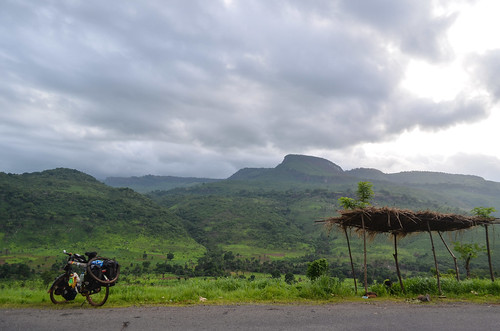
The day is pleasant but I miss already the relatively high lands of the Fouta: I am starting to sweat for no reason again. When comes the time to look for a place to camp, for my birthday evening, the people at the house near the pump of Sithé let me put up my tent next to them. I get to shower (I shower almost every day in Africa, where it is as easy to shower as it is to get dirty, unlike in Europe) and to join my hosts for dinner. The downside is that I realize what’s in the long buildings just next to me: chickens. Seven thousand of them. There is little chance for me to sleep well there …
Luckily there is not a single rooster in this farm and the morning is pretty quiet. I slept rather well if I ignore the intensive sweating and the hundreds of white butterflies sticking to the wet inside of my tent’s outer layer.
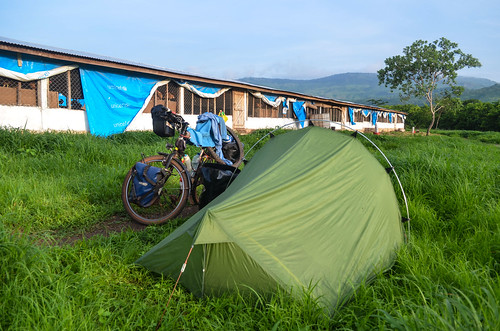
My host is nice and successful – they plan to extend the farm to 15000 chickens – but it didn’t prevent him to try to escape twice to Europe (without documents) and to Cape Verde. The only thing that made him quit is his recent wedding. He has to stay in Guinea and support his new family now.
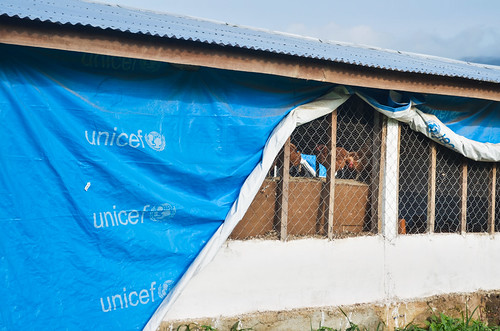
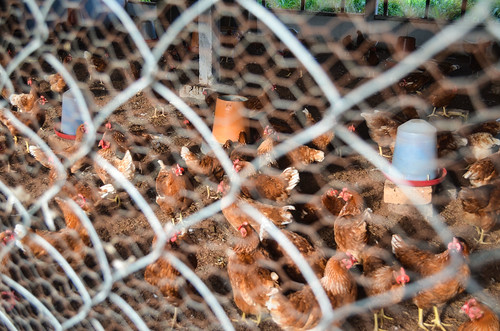
I have for breakfast eggs that cannot be fresher while my tent dries up.
The road on the way to Kindia is still a playground for crazy drivers and I am looking forward to leaving this main road. It seems the crazy drivers are also responsible for getting their truck out of the mess themselves. Indeed, I can’t imagine there is any business of quick assistance here. I have seen young men digging under their truck, fallen into a ditch, as if building a road of mud. It really looked hopeless.
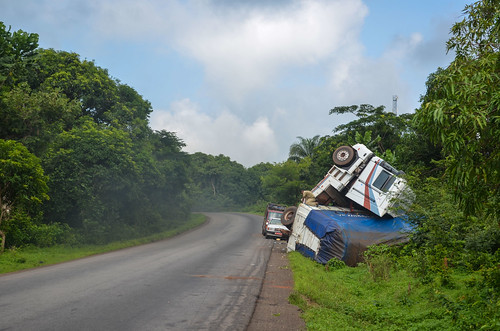
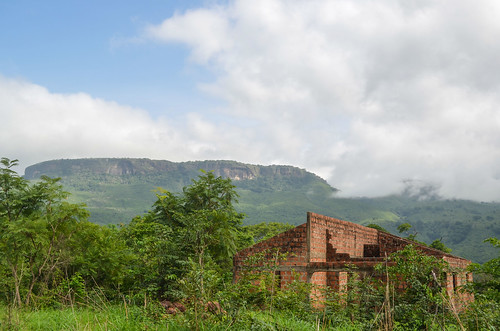
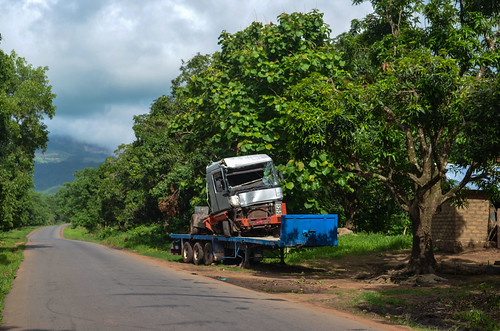
The road becomes more pleasant and quiet after I turn for the piste to Forecariah. This is a dirt track following the Guinea – Sierra Leone border, and in a way a shortcut. I have no reasons to visit Conakry, which is like Dakar and Bissau, at the end of a peninsula. As a result, the road Kindia – Coyah – Conakry must be congested and considering the drivers skills (and especially their regard for two-wheelers), I am better off those places.
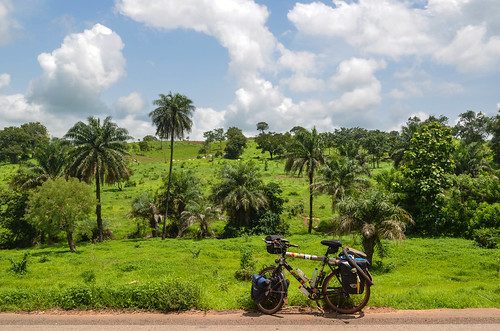
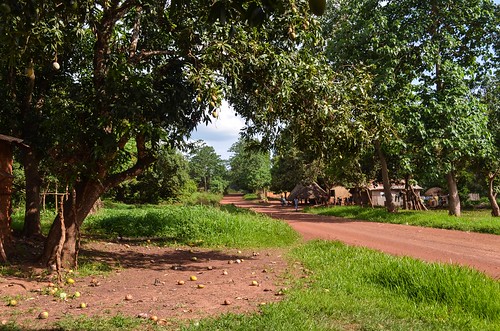
I am instantly happier having the whole “road” for myself. There are many fields of peanuts, rice, maize. There are no more trucks, but villages, mangoes and villagers. The road runs around the highest mountains of Basse Guinée, in the region of Benna.
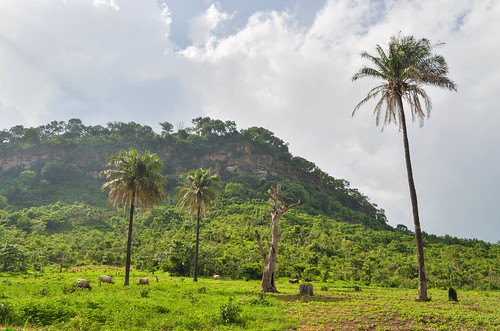
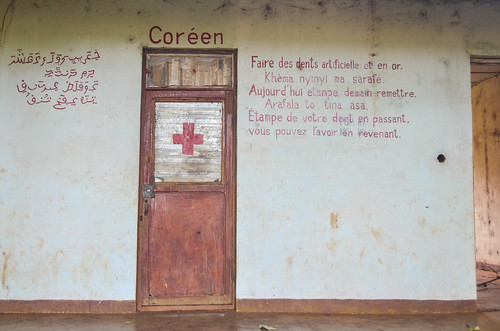
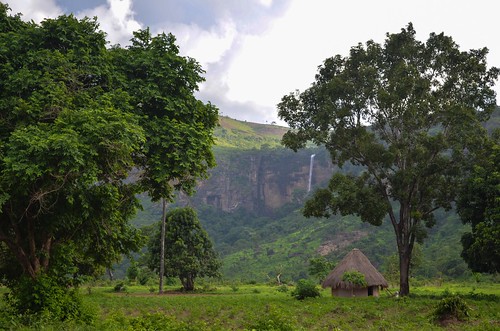
The ride is very pleasant but the thunder starts rolling. I spot a nice and empty place to hide right in front of a waterfall, but am refused the permission. I bet it is a misunderstanding with the people of the settlement nearby (only one kid has little knowledge of French), but I tried my best. I continue onto the next village, which happens to be far enough for the night to call the end of the day. I reach Gombokhori right at this time. The sky is black on both sides of the village.
There is a military checkpoint at the village entrance. They convince me that their camp, a single hut, is the best and safest place to stay at, and make me stay under a tree. I’d rather have a roof over my head. They claim “No problem, it won’t rain“, and that the place is quiet, when all the cars on the road must obviously stop at the barrier and honk. The situation doesn’t give me peace of mind and I slowly remember a saying from a traveler in Morocco: “In Morocco and Mauritania, the police/gendarmerie/army are the only people you can trust. Below Senegal, you can trust anyone but them“.
As the storm and lightnings are getting closer, I leave them and venture into Gombokhori to find a shelter. It is night already but I am spotted by a walker who takes me to Aboubacar, the chief of the youth. I am finally hosted in the charger room at the house of the président du district. I call it the charger room as they have a petrol generator and run a phone charging business: a wooden plate onto which are stuck dozens of power outlets and an impressive collection of chargers. People can come and leave their phone there, paying for the charge. Fortunately the generator is off for the night and the room is just big enough for me to roll out my mattress and hang my mosquito net.
I am still sweating after stopping and spend the evening with Aboubacar and his friends, and at least 30 kids sitting around and watching me. I learn that efficient medicines against malaria are present in the village, but the work of the chief of the health center lies somewhere else: kids die because their parents take them to the marabout and use a charm instead of trusting the medicines. We talk again about emigrating to France, and apparently the price from Guinea is 5000 € (all-inclusive). The crossing of the Gibraltar strait itself is 1500 €. Of course there is no insurance in case of death on the boat (the ocean is the cemetery) and no guarantee that the coast guards are not waiting upon arrival. On my question about trying the “legal” way, I got answered that “there are too many documents to fill, it’s expensive and too difficult. With the smuggler, you just pay and go, it’s easy!” …
I got used to Guinean French since I started cycling in the country. One can say “Ah ça c’est gâté, il faut envoyer 1000 francs pour gagner le rechange“. “Envoyer” is used for “payer, donner”, “gâté” for “cassé”, and “gagner” for about anything that can be translated with “to get” in English.
The next morning, the same 30 kids, or maybe 50, are watching me brushing my teeth and eating my breakfast. After the rice, we go for a picture session for everyone.
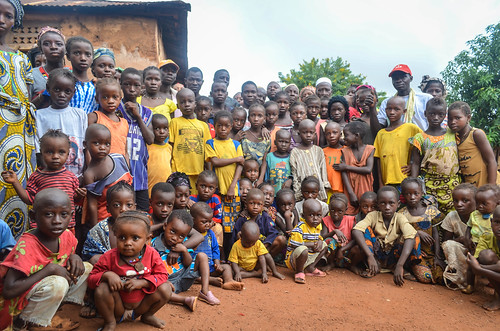
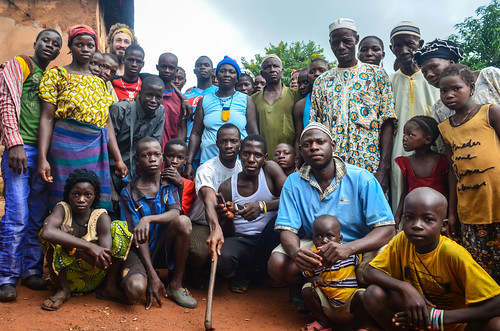


I am glad to have taken this secondary road as the people of Gombokhori/Benna are very nice and welcoming. I leave them under a light rain, a bit annoying but not strong enough to clean my dirty bike.
The rain is not that bad, but the mountains don’t look as good with the clouds.
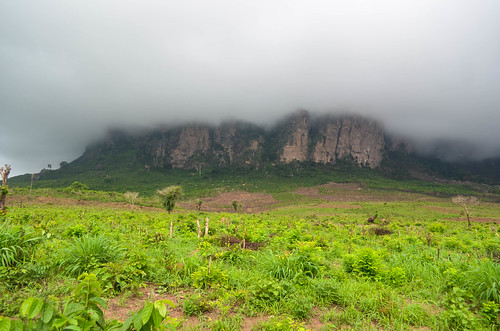
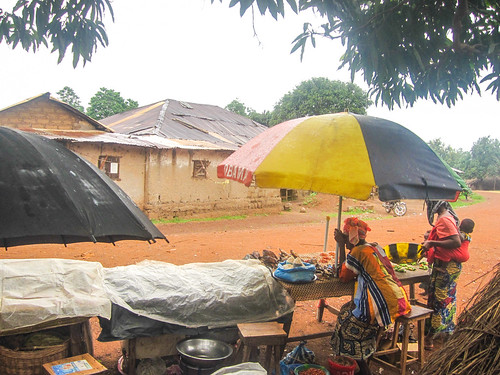
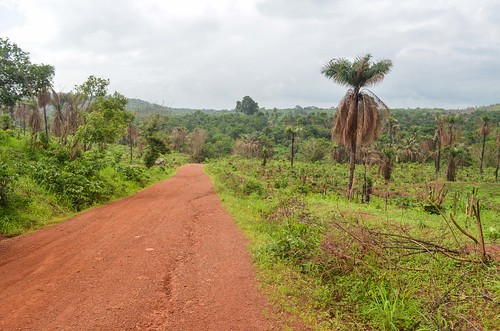
There is now a checkpoint by the army or the police in almost each village. This is a bit ridiculous, but they say that due the proximity with the Sierra Leone border (about 10 km away), the bandits come and go. Most of the checkpoint officials want my contact and phone number, to make friends. They seem to be expecting me to say “Hey friend, I’ll give you a passport and take you to my country“, but even if I say I can’t do anything, they are very satisfied with having my temporary phone number.
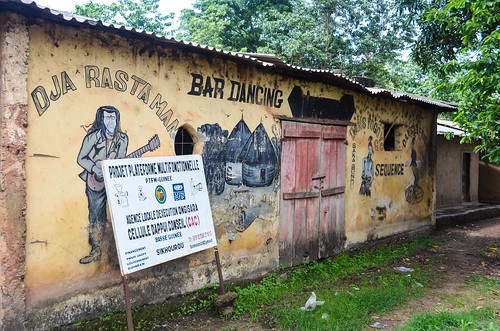
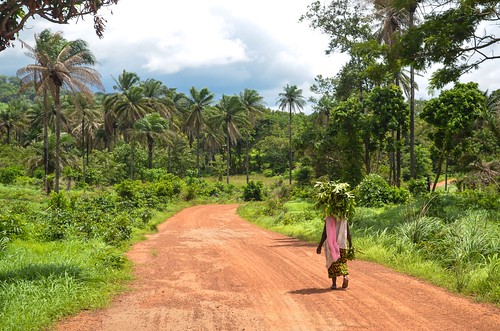
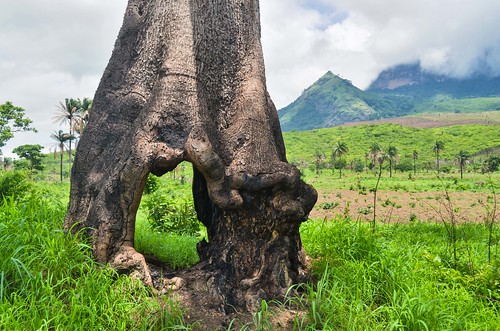
I have to brake suddenly when I see a leaf walking on the red mud in front of me. This is Gédéon the chameleon, probably a broken chameleon as he is still flashy green on the red track. We play together for a while. The kids playing on the nearby football field have stopped playing and are now watching me playing with the reptile. I start to believe I really am the greatest attraction of Guinea.
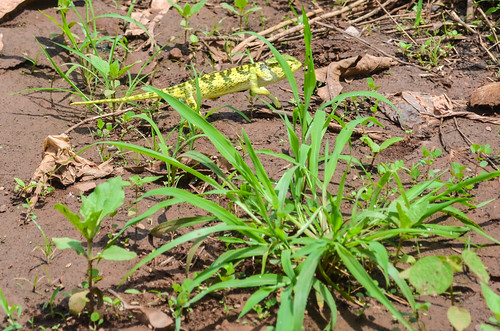
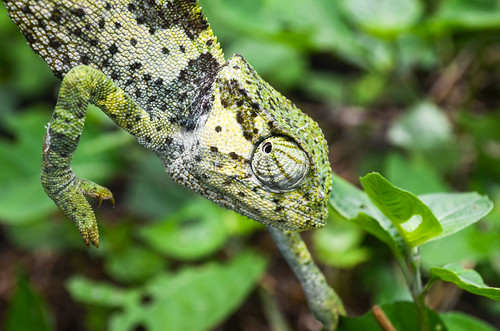
I have been told that there is some mining developing in the region, near Moussaya, with “White people from all over the world“, and I could ask to make a visit. Once in Moussaya, they tell me the site is actually in Laya, 17 km further on an even minor road. I don’t think a newborn mining site is worth 34 km.
However, I meet locals who are already “pre-approved” to work. Rio Tinto will exploit the bauxite in the region and build a railway. I guess they have a commitment towards the local communities. The “pre-approvement” seems to mean nothing beyond a health check. They cannot tell me when they will be able to work. This “depends on the elections“. They refer to the parliamentary elections, that have been delayed since 2010. There is currently no real parliament, so no decisions can be taken. So no beginning of work.
I have found a document detailing the 670 km long railway, that will pass just here in Moussaya. The gap between the mining company and the budget of Guinea is huge: USD 50 bn of revenue for Rio Tinto, USD 5 bn for Guinea’s GDP. The former plans to build roads, a railway and a port within 2 years. The later has probably never seen that, and will maybe get just a taste of it.
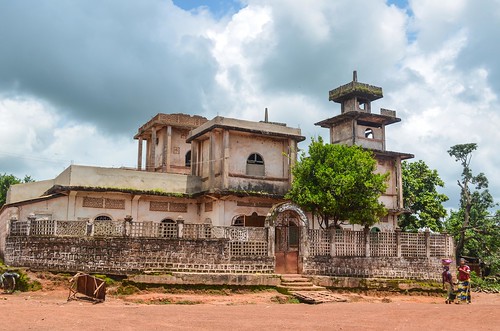

I am back on the asphalt in Forecariah. It looked like a decent town on the map, but is much smaller than I thought. On a gloomy day, with big clouds and occasional drizzles, it is not a place I would want to stay in. Most of it seems made of administrative buildings.
I decide to leave it and head towards the border with Sierra Leone, and stay at the last town. There is another checkpoint where about 10 policemen seem happy to stop me. My passport disappears in their hands while they ask many questions in English and Krio, as if we were already in Sierra Leone. I look American and they show off how well they can say “yeah man“. They finally return my passport, without having open it, asking of which nationality I am. Those useless checkpoints …

Farmoriah is the last town before the border town. The customs are here. I can sleep in a villa that has rooms for travelers passing by. It is a very nice place behind the customs office with a generator working until 11 pm, and I am surprised to be offered a room in such a place. All I know is that it belongs to someone important who authorized the locals to host travelers.
I am explained that there used to be a lot of French in Farmoriah. They had huge banana plantations, alongside with watermelons, tomatoes, etc, and a pier that shipped the goods directly to France. Apparently they had to leave when the president Touré came to power. The farming machines are still there, broken, the land is still there of course, but the plantations are not taken care of and the great potential remains unexploited. “We need investment to start working there again“, locals say. For my last night in the country, I will remember this sentence as an illustration of Guinea, the richest country of West Africa, inhabited by the poorest.
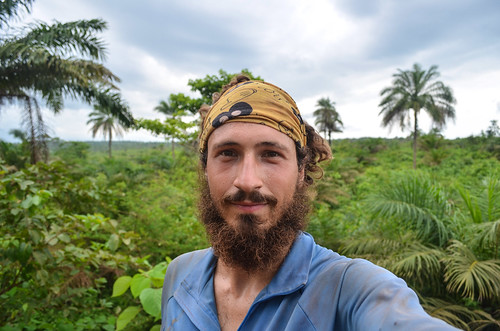






I lived in Guinea for three years and I never had the chance to get to Fouta. I was so happy to find your blog, it has brought back many happy memories. Thank you.
hello,
heureusement que les 7000 poulets ne t’ont pas demandé ton passeport.!
toujours d’aussi belles photos et surtout Gédéon .
Très belle conclusion sur la Guinée ,
Hehehe, “Gédéon the broken chameleon”.
Maybe the poor thing was already trying his hardest but was colourblind ;P
Then again, he did manage to convince you that he was a leaf 😀